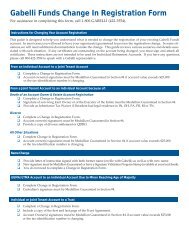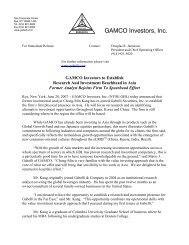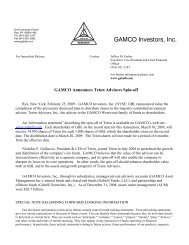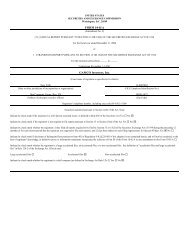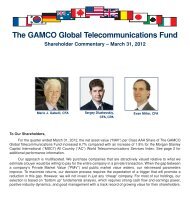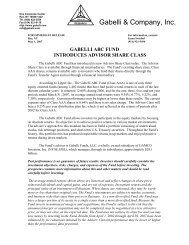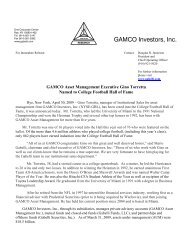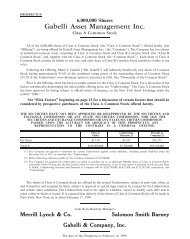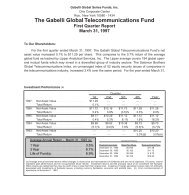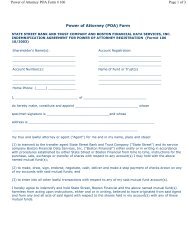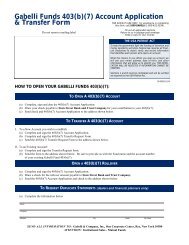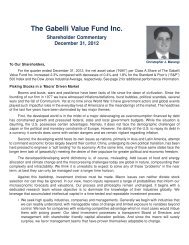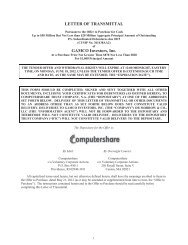Statement of Additional Info - Gabelli
Statement of Additional Info - Gabelli
Statement of Additional Info - Gabelli
Create successful ePaper yourself
Turn your PDF publications into a flip-book with our unique Google optimized e-Paper software.
These Funds may make a short sale in order to hedge against market risks when it believes that the price <strong>of</strong> a security may<br />
decline, causing a decline in the value <strong>of</strong> a security owned by the Funds or security convertible into, or exchangeable for,<br />
the security, or when the Funds do not want to sell the security they own, because among other reasons, they wish to defer<br />
recognition <strong>of</strong> gain or loss for U.S. federal income tax purposes. The Funds may close out a short position by purchasing<br />
and delivering an equal amount <strong>of</strong> securities sold short, rather than by delivering securities already held by the Funds,<br />
because the Funds may want to continue to receive interest and dividend payments on securities in its portfolio that are<br />
convertible into the securities sold short.<br />
The successful use <strong>of</strong> short selling may be adversely affected by imperfect correlation between movements in the price <strong>of</strong><br />
the security sold short and the securities being hedged.<br />
Lending Portfolio Securities (All Funds). To a limited extent, each Fund may lend its portfolio securities to brokers,<br />
dealers, and other financial institutions, provided it receives cash collateral which at all times is maintained in an amount<br />
equal to at least 102% and 105%, respectively, <strong>of</strong> the current market value <strong>of</strong> domestic and international securities<br />
loaned. By lending its portfolio securities, a Fund can increase its income through the investment <strong>of</strong> the cash collateral.<br />
For the purposes <strong>of</strong> this policy, the Funds consider collateral consisting <strong>of</strong> U.S. government or agency securities or<br />
irrevocable letters <strong>of</strong> credit issued by banks whose securities meet the standards for investment by the Funds to be the<br />
equivalent <strong>of</strong> cash. Such loans may not exceed 33-1/3% <strong>of</strong> a Fund's total assets. From time to time, a Fund may return to<br />
the borrower and/or a third party which is unaffiliated with the Fund, and which is acting as a "placing broker," a part <strong>of</strong><br />
the interest earned from the investment <strong>of</strong> collateral received for securities loaned.<br />
The SEC currently requires that the following conditions must be met whenever a Fund's portfolio securities are loaned:<br />
(1) the Fund must receive at least 100% cash collateral from the borrower; (2) the borrower must increase such collateral<br />
whenever the market value <strong>of</strong> the securities rises above the level <strong>of</strong> such collateral; (3) the Fund must be able to terminate<br />
the loan at any time; (4) the Fund must receive reasonable interest on the loan, as well as any dividends, interest or other<br />
distributions on the loaned securities, and any increase in market value; (5) the Fund may pay only reasonable custodian<br />
fees approved by the Trust’s Trustees in connection with the loan; (6) while voting rights on the loaned securities may<br />
pass to the borrower, the Trust’s Trustees must terminate the loan and regain the right to vote the securities if a material<br />
event adversely affecting the investment occurs, and (7) the Fund may not loan its portfolio securities so that the value <strong>of</strong><br />
the loaned securities is more than one third <strong>of</strong> its total asset value, including collateral received from such loans. These<br />
conditions may be subject to future modification.<br />
Such loans will be terminable at any time upon specified notice. A Fund might experience the risk <strong>of</strong> loss if the<br />
institution with which it has engaged in a portfolio loan transaction breaches its agreement with the Fund.<br />
Illiquid Securities and Rule 144A Securities (All Funds). Each Fund may invest its net assets in securities as to which<br />
a liquid trading market does not exist, provided such investments are consistent with the Fund's investment objective.<br />
Such securities may include securities that are not readily marketable, such as certain securities that are subject to legal or<br />
contractual restrictions on resale, repurchase agreements providing for settlement in more than seven days after notice,<br />
and certain privately negotiated, non-exchange traded options and securities used to cover such options. As to these<br />
securities, the Fund is subject to a risk that should the Fund desire to sell them when a ready buyer is not available at a<br />
price the Fund deems representative <strong>of</strong> their value, the value <strong>of</strong> the Fund's net assets could be adversely affected. Illiquid<br />
securities do not include securities eligible for resale pursuant to Rule 144A <strong>of</strong> the Securities Act <strong>of</strong> 1933, as amended<br />
(the "Securities Act"), or other restricted securities, which have been determined to be liquid in accordance with<br />
procedures established by the Board.<br />
The Funds (except for the Mid-Cap Equity Fund) have adopted fundamental policies with respect to investments in<br />
illiquid securities. Securities that have not been registered under the Securities Act are referred to as private placements<br />
or restricted securities and are purchased directly from the issuer or in the secondary market. Mutual funds do not<br />
typically hold a significant amount <strong>of</strong> these restricted or illiquid securities because <strong>of</strong> the potential for delays on resale<br />
and uncertainty in valuation. Limitations on resale may have an adverse effect on the marketability <strong>of</strong> portfolio securities<br />
and a mutual fund might be unable to dispose <strong>of</strong> restricted or illiquid securities promptly or at reasonable prices and<br />
might thereby experience difficulty satisfying redemptions within seven days. A mutual fund might also have to register<br />
such restricted securities in order to dispose <strong>of</strong> them resulting in additional expense and delay. Adverse market<br />
conditions could impede such a public <strong>of</strong>fering <strong>of</strong> securities.<br />
A large institutional market has developed for certain securities that are not registered under the Securities Act, including<br />
repurchase agreements, commercial paper, foreign securities, municipal securities, and corporate bonds and notes.<br />
18




